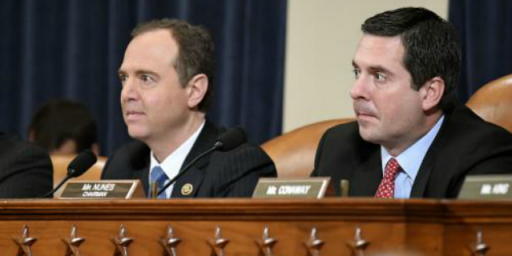Newsweek: Rumsfeld Planning Iraq Exit Strategy
Michael Hirsh and John Barry report on a “secret plan” by the Defense Department to get American troops out of Iraq.
Drawing Down Iraq (Newsweek, 8 Aug)
Donald Rumsfeld doesn’t like long-term occupations. He’s always made that clear. After U.S. forces took Baghdad, the Defense secretary had plans to reduce the U.S. presence in Iraq to 40,000 troops by the fall of 2003. Then the insurgency struck.
Now Rumsfeld is quietly moving toward his original goal—three years late. The Pentagon has developed a detailed plan in recent months to scale down the U.S. troop presence in Iraq to about 80,000 by mid-2006 and down to 40,000 to 60,000 troops by the end of that year, according to two Pentagon officials involved in the planning who asked not to be identified because of the sensitive nature of their work. Their account squares with a British memo leaked in mid-July. “Emerging U.S. plans assume that 14 out of 18 provinces could be handed over to Iraqi control by early 2006, allowing a reduction in overall [U.S. and Coalition forces] from 176,000 down to 66,000,” says the Ministry of Defense memo.
[…]
[E]arlier this year the Pentagon had been mum on a withdrawal timetable, in part so as not to encourage the insurgents. Now the conditions for U.S. withdrawal no longer include a defeated insurgency, Pentagon sources say. The new administration mantra is that the insurgency can be beaten only politically, by the success of Iraq’s new government.
Indeed, Washington is now less concerned about the insurgents than the unwillingness of Iraq’s politicians to make compromises for the sake of national unity. Pentagon planners want to send a spine-stiffening message: the Americans won’t be there forever. U.S. domestic factors are also forcing President Bush’s hand. The Bush administration wants to pre-empt growing public pressure for withdrawal, which could give the insurgents a Vietnam-like strategic goal. Military planners, meanwhile, are deeply concerned about driving away Army careerists and recruits if current deployments are forced into 2007. If the U.S. Army has to do another rotation into Iraq in the fall of 2006 to keep force levels up to their current 138,000, it “goes off a cliff,” says retired Gen. Barry McCaffrey.
The question is whether the insurgents will see the U.S. plan as a rush to the doors. And whether they and Iraqi militias will come to dominate the country in the vacuum left by U.S. forces, leading to civil war. A too-rapid withdrawal could even hand a victory to foreign jihadists streaming into Iraq. “What we have is a plan of action for pulling our troops out, not a strategy for success,” says Andrew Krepinevich, a Washington strategist. “That’s more of a Vietnam solution: ‘Peace with honor’.” The phrase proved hollow back then. The Pentagon is betting it won’t this time.
Of course, this all depends on one’s definition of “success.” Obviously, our goal in entering Vietnam was not met, as it involved, at the very minimum, the sustained independence of the Republic of Vietnam. On the other hand, defeating the “insurgency” clearly was not our goal in entering Iraq, given that the “insurgency” was a reaction to the war, not a cause.
The proximate U.S. goal was “regime change,” which was accomplished in less than a month. The broader goal was rather fuzzier, a democratic Iraq. If all goes according to plan, though, Iraq will have a new constitution and a second fair and open election very soon. That sounds rather a lot like democracy.
Ultimately, though, the rationale behind the goals of “regime change” and “democratization” was something much more ambitious and difficult to measure: a ripple effect in the Arab Middle East that would get at the root causes of terrorism. While there have been some positive developments in that regard, there’s no immediate indication of which I’m aware that the Arabs are set to throw out the despots and take the reins of power for themselves. To the extent that is going to happen, though, it seems much more likely with the Iraqis running their own government and without tens of thousands of American troops serving as a rallying point for terrorists.




Talk about moving the goalposts!
Yes and Rumsfeld also planning retirement. The point?
Sorry, Don – were you commenting on my comment, or on James’ post?
I think the question is whether the Iraqis themselves can take care of their own country – the LAST thing we need is another failed state like Afghanistan before the Taliban (and I am definitely not supporting them!!!!). I am worried that if the best military in the world can’t stop the insurgents, it seems likely that the Iraqis will have trouble as well. Anyway, no matter what your political stripe and opinion of the president, support for the reconstruction effort should be (and to a large degree is) critical to all Americans if we don’t want to be back there is 5-10 years all over again. It’s a tough problem…I wish the administration the best, and hope their plans work…
You talk about our goal in entering Viet Nam. But wasn’t our goal in entering Iraq to stop Saddam from using those tanker trucks full of sarin gas he had? And to dismantle his nuclear program, which we were also 100% sure he had? And those unmanned drones, that could drop anthrax on the UK on 45 minutes notice and certainly weren’t made of balsa wood? I don’t know if that was really Bush’s reason for getting us into Iraq, but that was his stated reason.
All of the high-minded talk about democracy and the roots of terrorism didn’t start until all of the original rationales had been shown to be lies. And if Bush’s goal was really to prevent terrorism, why did he invade pretty much the only country in the region not affiliated with Al Qaeda, and turn it into the same kind of failed state/breeding ground that Afghanistan was pre-9/11, and most of Afghanistan still is?
I sincerely hope we can find a way out of this mess, and I have no doubt that our troops could get the job done if they had better planning and better leadership. But I really don’t think we’re going to see any success as long as Bush is in charge. And I’m not basing that on anything but Bush’s record so far.
After 9/11, there seemed to be a clear course of action that nearly everyone agreed on: take out the Taliban, and turn Afghanistan into a stable nation that doesn’t support terrorism. Then use the nearly unaminous international support we enjoyed at the time to hunt down and destroy Al Qaeda. Oh, and get Osama bin Laden, “dead or alive.” Bush did step one. Our military did a fantastic job taking out the Taliban quickly with a minimum of casualites. Then Bush half-heartedly started rebuilding Afghanistan. But whether he got impatient or what, he left that job unfinished, and jumped ahead to a job that didn’t need to be done: invading a country that wasn’t affiliated with Al Qaeda, wasn’t connected to 9/11, and wasn’t a threat to the U.S.
Whether or not the world is better off without Saddam, it would be a hell of a lot better off without Al Qaeda, as any Londoner could tell you. But every soldier Bush sent to Iraq is one not busting up an Al Qaeda camp. Every dollar spent on the Iraq war is one not spent disrupting AQ’s funding. After 9/11, we had a clear mission to dismantle Al Qaeda, which Bush walked away from. What makes anyone think he’ll have any more success with his Iraq adventure?
Quite plausible—Rumsfeld is a pragmatist, albeit a clumsy, careless pragmatist.
Barry:
I was commenting on the story. Good post. Good comment. I just don’t like the tone of the article
The real question is: How will the new Iraq army stand up to the several different factions who are determined to fight against them? What resources do they have that are not a gift from the US taxpayer? How long will we keep them in weapons, intelligence, and money before we move on to the next national distraction?
From what I have seen we are not positioning the country to be controlled by a stable national government. Instead we are arming one side of a quadrilateral civil war.
It looks like that, with an election coming up near the end of 2006, the Bush administration has decided to declare a victory and get out.
The reason that one can dispute whether our objetives will have been met or not is that the Administration’s rationale for fighting the War keeps changing. But if the objective is the creation of a stable democratic government so that the country will not be a haven for terrorists, the objective will most probably not have been met.